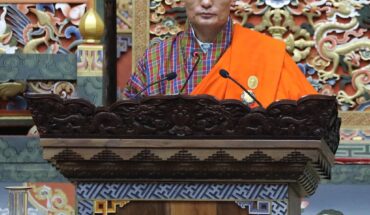
NGAWANG JAMPHEL
Thimphu
The Member of Parliament (MP) from Lamgong-Wangchang Sonam Tashi moved a significant motion in the National Assembly on the challenges faced by Bhutanese contractors and suppliers due to the newly implemented Procurement Rules and Regulations of 2023.
This motion, aimed at addressing pressing issues, gained prominence in the context of the 13th Five-Year Plan, which boasts a historic budget of Nu 512.283 billion, reflecting a 63% increase over the previous plan. Notably, the capital budget accounts for Nu 245 billion, representing 47.83% of the total outlay, underscoring the need for robust and fair procurement mechanisms.
The MP highlighted ten recommendations to improve the procurement process, enhancing fairness, efficiency, and inclusivity. The first recommendation called for the removal of the Dzongkhag-based business requirement, which restricts competition to local entities.
This limitation, the MP argued, hinders the participation of contractors from other regions, reducing opportunities for fair competition and growth. Allowing contractors from across the country to compete would foster a more equitable and vibrant private sector.
Another key recommendation was the establishment of robust selection criteria to guide the Tender Committee’s decision-making process. The MP emphasized that such criteria would ensure fairness and transparency, reducing the potential for bias in awarding contracts. Alongside this, the MP proposed the exclusion of contractors with negative records, including those with a history of work terminations, corruption charges, or ongoing litigation. This measure is expected to maintain project integrity and safeguard public funds.
A critical concern raised during the deliberations was the financial strain on contractors due to the current retention money policies. To alleviate this, the MP proposed a phased release of retention money, allowing contractors to access it in instalments. This would improve their cash flow while maintaining defect liability assurances.
Furthermore, the MP recommended transparent sharing of departmental estimates to ensure all bidders have equal access to critical information, promoting fair competition and reducing potential biases.
The technical resource requirements in the current regulations were also addressed. The MP suggested modifying these requirements to allow bidders to secure necessary personnel and equipment during project execution rather than at the bidding stage.
This adjustment would make the process more flexible and realistic for contractors, particularly smaller firms. Additionally, promoting joint ventures among contractors was emphasized as a way to enhance collaboration and improve project delivery.
The integration of e-procurement systems was another focal point. The MP proposed streamlining the procurement process by integrating the government e-procurement system with relevant databases. This move aims to eliminate manual errors and improve efficiency, aligning with global best practices. The outsourcing of design and estimation tasks to private consultants was also suggested. This would enable agency engineers to focus on monitoring and evaluation, ensuring higher-quality project execution.
The final recommendation centered on implementing robust monitoring mechanisms to ensure compliance with procurement rules and maintain project quality. This would establish effective oversight throughout the execution phase, addressing concerns of inefficiency and corruption.
During the deliberations, members of Parliament expressed strong support for the motion and the ten recommendations. They emphasized the importance of supporting the private sector, noting that many Bhutanese rely on it for their livelihoods. Members stressed the need for service delivery that is both people-friendly and service-oriented. Avoiding direct and limited tenders was highlighted as a key step to curb inequality and corruption.
Health Minister Tandin Wangchuk raised a pertinent issue, noting the apparent existence of two sets of procurement regulations—one for the government and another for the private sector. This discrepancy, according to the minister, has hindered the growth of private companies and sectors. To address this, the Health Minister called for a proper tender procedure that ensures equal opportunities and benefits contractors across the board.
The discussion also included a proposal from the Bartsham-Shongphu MP Rinchen Wangdi, suggesting that the government introduce a Procurement Bill. Such legislation would institutionalize the recommendations and provide a comprehensive framework for procurement in Bhutan. The proposal garnered significant support, with the majority of members raising their hands in favor, leading to its inclusion as an additional recommendation.
The motion was met with unanimous support, with all 43 members present voting in favor. The National Assembly instructed the Ministry of Finance to review the recommendations and submit a detailed report. This endorsement reflects the House’s commitment to addressing procurement-related challenges and ensuring a more inclusive and transparent system.
The motion’s emphasis on reforming procurement rules comes at a critical time for Bhutan, as the country embarks on an ambitious 13th Five-Year Plan. The unprecedented budget allocation underscores the importance of an efficient and equitable procurement system to maximize the impact of public investments. The proposed changes aim to empower contractors, enhance competition, and promote sustainable growth within the private sector.
As the government reviews the recommendations, the focus will be on implementing measures that align with the principles of fairness, transparency, and accountability. By addressing the challenges highlighted in the motion, Bhutan can pave the way for a more efficient procurement system that supports the nation’s development goals while fostering a thriving private sector. The unanimous endorsement of the motion by the National Assembly marks a significant step forward in achieving these objectives.





